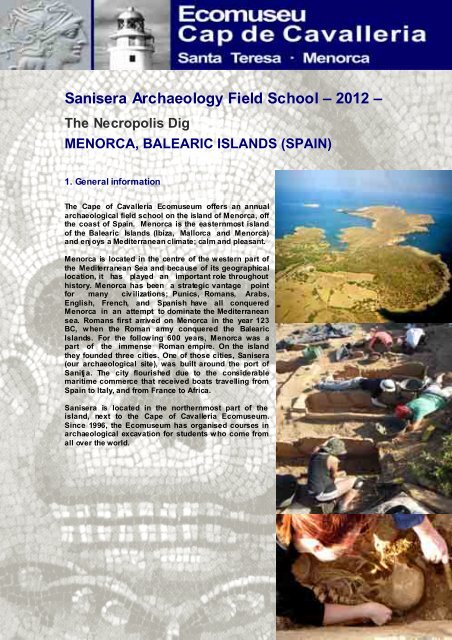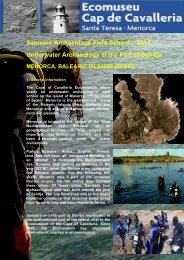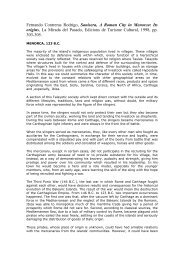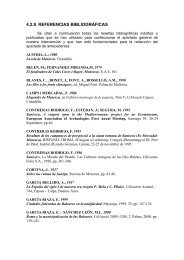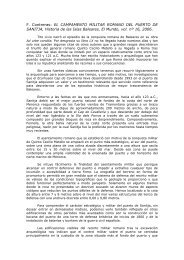The Roman City and Necropolis Dig - Sanisera Field School
The Roman City and Necropolis Dig - Sanisera Field School
The Roman City and Necropolis Dig - Sanisera Field School
You also want an ePaper? Increase the reach of your titles
YUMPU automatically turns print PDFs into web optimized ePapers that Google loves.
<strong>Sanisera</strong> Archaeology <strong>Field</strong> <strong>School</strong> – 2012 –<br />
<strong>The</strong> <strong>Necropolis</strong> <strong>Dig</strong><br />
MENORCA, BALEARIC ISLANDS (SPAIN)<br />
1. General information<br />
<strong>The</strong> Cape of Cavalleria Ecomuseum offers an annual<br />
archaeological field school on the isl<strong>and</strong> of Menorca, off<br />
the coast of Spain. Menorca is the easternmost isl<strong>and</strong><br />
of the Balearic Isl<strong>and</strong>s (Ibiza, Mallorca <strong>and</strong> Menorca)<br />
<strong>and</strong> enjoys a Mediterranean climate; calm <strong>and</strong> pleasant.<br />
Menorca is located in the centre of the w estern part of<br />
the Mediterranean Sea <strong>and</strong> because of its geographical<br />
location, it has played an important role throughout<br />
history. Menorca has been a strategic vantage point<br />
for many civilizations; Punics, <strong>Roman</strong>s, Arabs,<br />
English, French, <strong>and</strong> Spanish have all conquered<br />
Menorca in an attempt to dominate the Mediterranean<br />
sea. <strong>Roman</strong>s first arrived on Menorca in the year 123<br />
BC, w hen the <strong>Roman</strong> army conquered the Balearic<br />
Isl<strong>and</strong>s. For the following 600 years, Menorca was a<br />
part of the immense <strong>Roman</strong> empire. On the isl<strong>and</strong><br />
they founded three cities. One of those cities, <strong>Sanisera</strong><br />
(our archaeological site), was built around the port of<br />
Sanitja. <strong>The</strong> city flourished due to the considerable<br />
maritime commerce that received boats travelling from<br />
Spain to Italy, <strong>and</strong> from France to Africa.<br />
<strong>Sanisera</strong> is located in the northernmost part of the<br />
isl<strong>and</strong>, next to the Cape of Cavalleria Ecomuseum.<br />
Since 1996, the Ecomuseum has organised courses in<br />
archaeological excavation for students w ho come from<br />
all over the world.
2. Course Description<br />
<strong>The</strong> Cape of Cavalleria Ecomuseum in Menorca, Spain, has<br />
scheduled for 2012, the excavation of a cluster of roman tombs<br />
belonging to a cemetery located on the outskirts of the roman<br />
city of <strong>Sanisera</strong> that was occupied from 123 BC to 550 AD. <strong>The</strong><br />
excavation is directed by Fern<strong>and</strong>o Contreras, director of the<br />
Ecomuseum of the Cape of Cavalleria in collaboration w ith<br />
other specialists in physical anthropology <strong>and</strong> conservation.<br />
<strong>The</strong> course runs 7 hours a day w hich is divided betw een<br />
excavation of the tombs <strong>and</strong> laboratory w ork; study <strong>and</strong><br />
conservation of the human remains <strong>and</strong> other materials<br />
recovered relating to the <strong>Necropolis</strong>. <strong>The</strong> fieldw ork focuses on<br />
funerary structures, specifically inhumation graves. Students<br />
will also participate in lectures, classes, exercises <strong>and</strong><br />
excursions related to the course material. For every seven<br />
course days there are two days off.<br />
Participants will learn <strong>and</strong> apply excavation techniques used in<br />
physical anthropology w hen excavating the tombs. In the<br />
laboratory, participants w ill follow guidelines set by an<br />
anthropologist <strong>and</strong> other specialists for the classification,<br />
study, <strong>and</strong> conserv ation of human remains <strong>and</strong> other related<br />
material found. Participants will also be given lectures on<br />
methodology, roman archaeology, physical anthropology <strong>and</strong><br />
classification of archaeological materials. Participants will visit<br />
other archaeological sites on the isl<strong>and</strong> through organized<br />
excursions. Courses are given in both English <strong>and</strong> Spanish.<br />
3. Certificates<br />
At the end of the course, students will receive a<br />
certificate of participation stating the hours <strong>and</strong> activ ities of the<br />
course.<br />
Participants that perform exceedingly well in the course may<br />
receive a letter of recommendation from our organization upon<br />
request.<br />
4. Directed at<br />
<strong>The</strong> course is open to any individual that would like to learn<br />
about archaeology. Although, w e do recommend a strong<br />
interest in physical anthropology, prev ious know ledge or<br />
experience is not required.
5. Sessions <strong>and</strong> Cost<br />
10 Sessions (20 days each):<br />
Session #1: April 20 – May 9 $ 1300<br />
Session #2: May 12 – May 31 $ 2100<br />
Session #3: June 3 – June 22 $ 2600<br />
Session #4: June 25 – July 14 $ 2600<br />
Session #5: July 17 – August 5 $ 2600<br />
Session #6: August 8 – August 27 $ 2100<br />
Session #7: August 30 – September 18 $ 2100<br />
Session #8: September 20–October 9 $ 1500<br />
Session #9: October 12 – October 31 $ 1300<br />
Session #10: November 3 –November 22 $ 1300<br />
Course fee includes:<br />
• Course tuition.<br />
• Accommodation in the Student Residency in<br />
Ciutadella. Two to six per room. Near the historic<br />
center, port <strong>and</strong> beaches.<br />
• Daily transportation to/from the excav ation site.<br />
• Breakfast, lunch <strong>and</strong> dinner in Ciutadella.<br />
• Morning snack at the Ecomuseum.<br />
• Accident insurance at the site.<br />
• Excursion.<br />
• Certificate of participation.<br />
Airfare not included.<br />
6. Spaces available<br />
This course has limited av ailability. Reservations are only effectiv e<br />
when payment of the registration fee is received. If for any reason<br />
the course is cancelled, payment is returned according to the<br />
field school refund policy (see the Ecomuseum’s webpage,<br />
Archaeology <strong>Field</strong> <strong>School</strong>).<br />
7. Information <strong>and</strong> reservations<br />
For more information, contact :<br />
Email: archaeology@ecomuseodecavalleria.com<br />
Phone: +34 971 35 9999<br />
Web page: www.ecomuseodecavalleria.com


